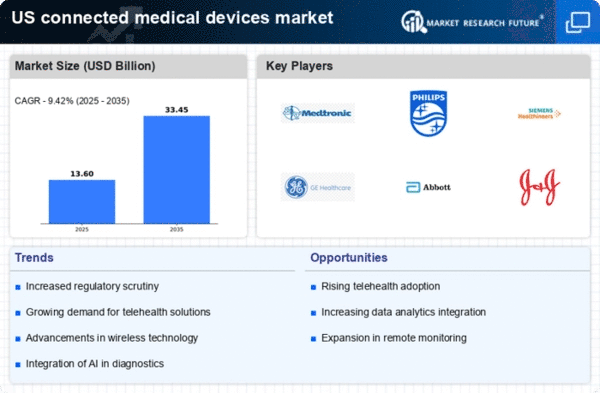Increased Focus on Preventive Healthcare
The connected medical-devices market benefits from a growing focus on preventive healthcare strategies. As healthcare costs continue to rise, there is a growing emphasis on early detection and prevention of diseases. This shift is reflected in the rising adoption of connected devices that monitor health metrics, such as blood pressure and glucose levels, enabling individuals to take proactive measures. Data indicates that preventive healthcare can reduce overall healthcare expenditures by up to 30%. Consequently, the demand for connected medical devices that support preventive care is likely to expand, as both consumers and healthcare providers seek to mitigate health risks before they escalate.
Growing Consumer Awareness and Engagement
Consumer awareness and engagement are critical drivers of the connected medical-devices market. As individuals become more informed about health management and the benefits of connected devices, their willingness to adopt these technologies increases. Educational campaigns and the proliferation of health-related information through digital platforms have empowered consumers to take charge of their health. Recent surveys indicate that over 70% of consumers in the US express interest in using connected devices for health monitoring. This growing engagement not only fuels demand for innovative products but also encourages manufacturers to enhance their offerings, thereby propelling the connected medical-devices market forward.
Technological Advancements in Connectivity
Technological advancements in connectivity are significantly influencing the connected medical-devices market. Innovations such as 5G technology and improved wireless communication protocols are enhancing the functionality and reliability of medical devices. These advancements allow for faster data transmission and improved device interoperability, which are crucial for effective remote monitoring and telehealth applications. As of 2025, it is estimated that nearly 80% of healthcare organizations in the US will adopt 5G-enabled devices, facilitating seamless communication between patients and healthcare providers. This trend not only enhances patient outcomes but also streamlines healthcare operations, thereby driving the growth of the connected medical-devices market.
Rising Demand for Remote Patient Monitoring
The connected medical-devices market is experiencing a notable surge in demand for remote patient monitoring solutions. This trend is driven by the increasing prevalence of chronic diseases, which necessitate continuous health monitoring. According to recent data, approximately 60% of adults in the US live with at least one chronic condition, leading to a heightened need for devices that facilitate real-time health tracking. Remote monitoring devices enable healthcare providers to collect vital data, enhancing patient engagement and adherence to treatment plans. This shift towards proactive healthcare management is likely to propel the growth of the connected medical-devices market, as patients and providers alike recognize the benefits of timely interventions and personalized care.
Regulatory Support for Digital Health Innovations
Regulatory support for digital health innovations is playing a pivotal role in shaping the connected medical-devices market. The US government has implemented various initiatives aimed at promoting the adoption of digital health technologies, including streamlined approval processes for connected devices. This regulatory environment encourages innovation and investment in the sector, as companies are more willing to develop new products knowing that they will receive timely regulatory feedback. As of 2025, it is projected that the market will see a 25% increase in new product launches, driven by favorable regulatory conditions. This supportive framework is likely to enhance the overall growth trajectory of the connected medical-devices market.

















